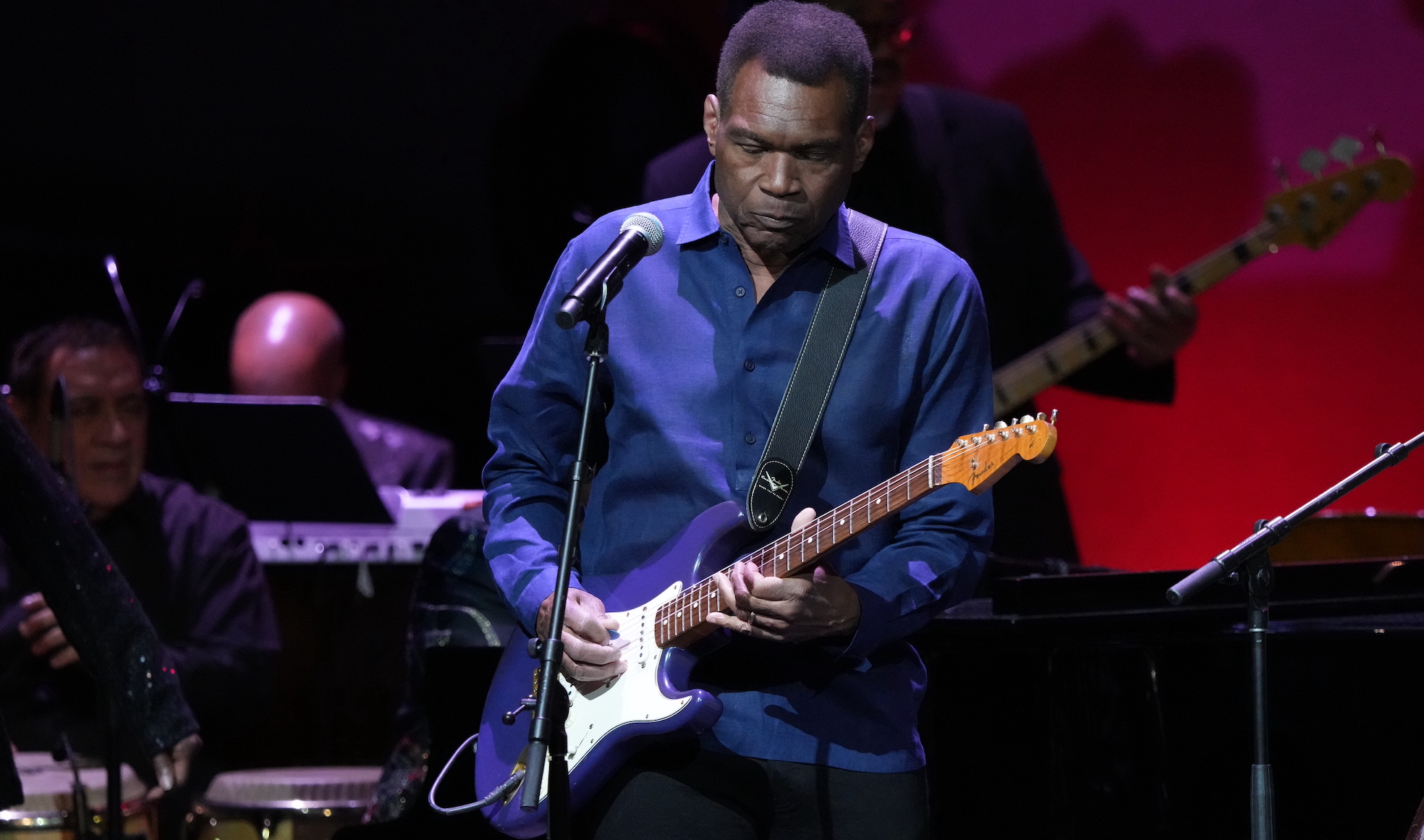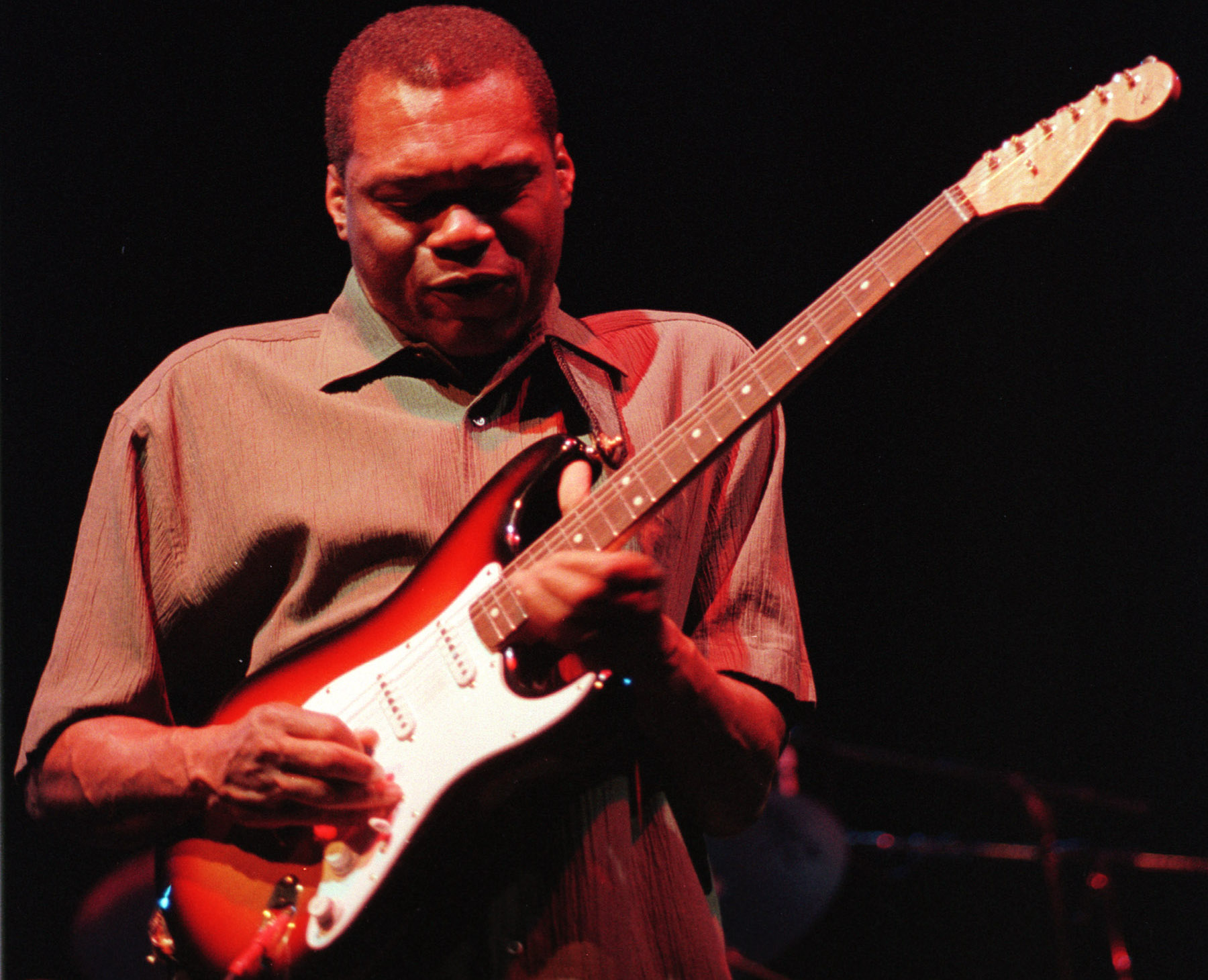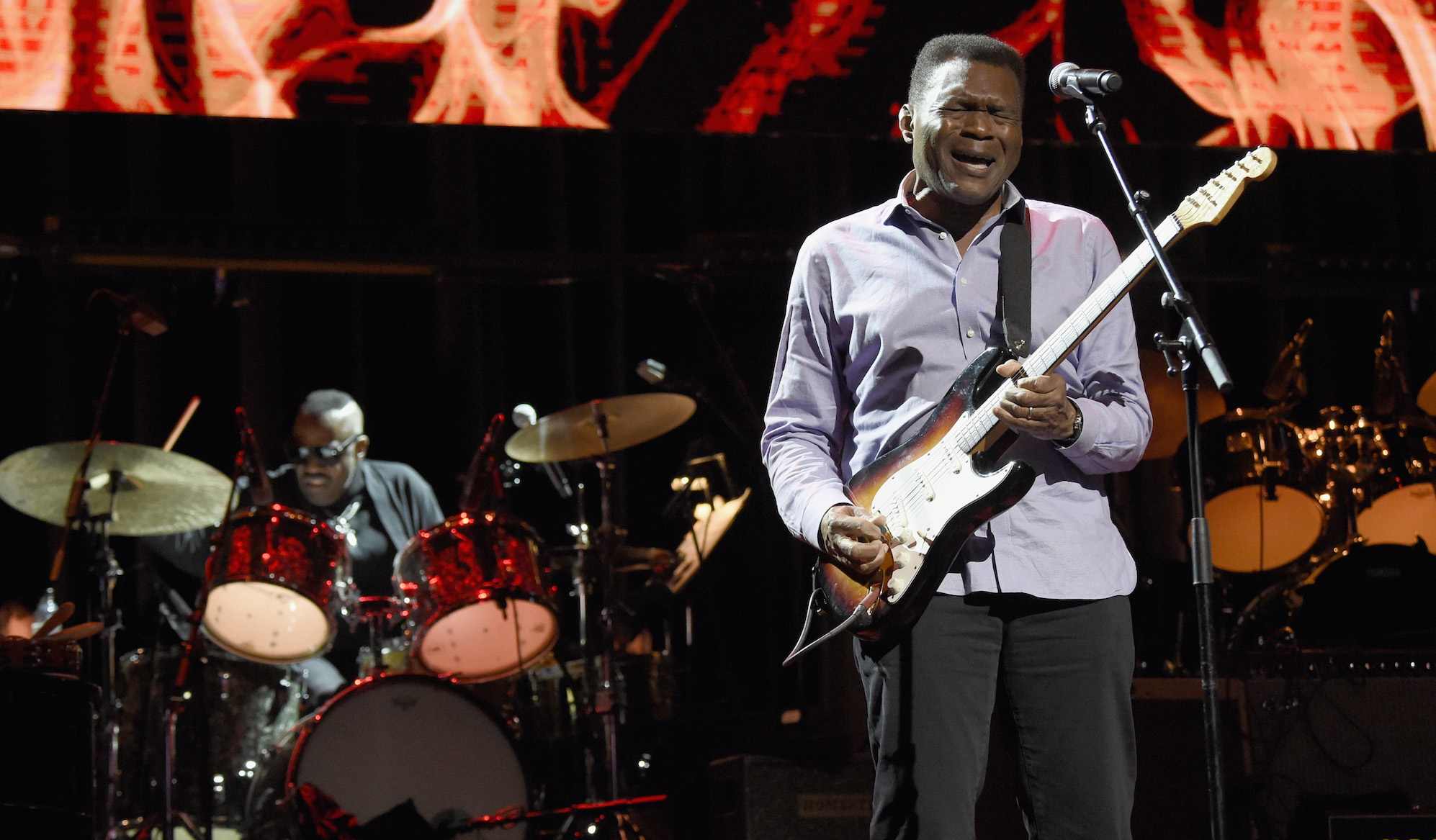“Practicing a solo puts you in a position of being unable to reach it later. I don't subscribe to that theory. My solos have to come straight out of me in the moment”: Robert Cray on his return to the road and why the blues must evolve to survive
Back in the limelight thanks in part to an initiative by Vernon Reid, the veteran guitarist reflects on what made him a Strat man for life, and why we all need to accept that “there will never be another Howlin' Wolf or Muddy Waters”

Robert Cray is back at it, something that's refreshing to see, as he's been “mostly off the road” in the aftermath of the COVID-19 pandemic. And, he’s feeling energized and “fortunate to be up and running again,” but, understandably, it took the veteran Strat-slinger a moment or three to regain his form.
“Getting the flow back took a minute,” Cray says, “But we're back at it and did a few European tours, which went great. We're ready to work our butts off here in the States now; it's been going pretty well.”
But that's nothing new, as, for more than four decades, things have been going more than “pretty well” for Cray, who's made quite the name for himself as a sometimes pop-leaning, often blues-inspired, and always über-soulful player capable of slicing and dicing his way through incredibly energetic sets.
Given Cray’s formidable chops – which he couples with oodles of melody and soaring solos – one would assume that, despite the time his Strat spent collecting dust, he’d be back to moving and grooving rather quickly. Then again, idle hours are the devil's playground, and noodling at home is a far different animal than dominating the stage.
“You are correct,” Cray says in agreement. “It is a whole different animal. Getting on stage brings different energy, and more adrenaline is running through my system. Getting back up to speed is tough, so it's important to listen and pay attention, and work through the struggle.”
Having not released a new album since 2020, Cray's muse is patiently waiting. But that's not to say that Cray is unaware of the ticking clock, and his fans' impatiently tapping feet – quite the contrary.
“I'm just starting that process,” he says. “I was thinking about getting into the studio over the winter, but I need more time.”
Get The Pick Newsletter
All the latest guitar news, interviews, lessons, reviews, deals and more, direct to your inbox!
“I want to try and summon more material,” he explains. “That way, I'll have something solid when I return to the studio. But hopefully, we'll be back in the studio soon, with an eye to get something going and out in 2024.”
It seems that the juices are flowing for the 70-year-old blues icon, which is timely, as he's got boatloads of new fans – particularly on X (formerly Twitter) – because of Living Colour's Vernon Reid compelling his followers to 're-amp' and follow Cray (along with several other under-appreciated guitarists).
Now in possession of an X account boasting (at the time of this writing) nearly 13,000 followers, Cray looks back on Reid's kindness, saying, “First of all, I'd like to thank Vernon. I've had the opportunity to meet him a few times, and he's lovely.”
As for how he became aware of Reid's campaign, Cray says, “My wife does all the social media stuff, and one day, she said, 'Hey, Vernon Reid has challenged his fans to get you up to 10,000 followers on X!' I said, 'Oh, that's pretty cool,' and she said, 'Yeah, it is.' We didn't think much about it then, so it's fantastic it happened, and we want to thank Vernon for doing it. And thank Guitar World for picking up on it.”

To Reid's point, it's a travesty that a player like Cray – who has 19 solo albums and dozens of studio credits to his name – could be so overlooked in the first place. But that sort of thing doesn't bother Cray, nor does he think too deeply into the reasons behind it, though he does feel it's “fantastic” and “wonderful,” and remains “thankful that Vernon did that.”
“It's great,” he says, “But I don't feel too overlooked because I've had major exposure. But like anybody not currently on the radio, sometimes things like that happen. Playing the kind of music I do, I never expect to be at the same level as the stuff with the highest exposure rating. It's great that Vernon is doing what he's doing, but regardless, we'll be out there having fun. So, the more the merrier – it's a cool thing; keep following!”
How has your songwriting process evolved since your early days?
“I've been fortunate to have contributions from many great players. I’ve worked with people who would paint pictures with how they wrote, so I've always kept that in mind. But I've also realized that only some things need to be so serious when I'm writing. I can have fun, write goofy things, or, depending on the mood, go in a more serious direction.
“I look at many perspectives, and I've taken account of many things I've learned from working with various people. I keep all of that in mind when writing.”
If you're doing it exactly as you played it on the record, it's not exciting
How does that impact the way you put solos together? Do you work them out beforehand, or are you the type to let it fly in the moment?
“Oh, I'm in the moment when soloing. Practicing a solo ahead of time puts you in a position of being unable to reach it later. I don't subscribe to that theory or that way of doing a solo. My solos have got to come straight out of me at the moment I'm doing them.”
There's something to be said about going into a meditative state when playing.
“Yes, that's how it is for me. But it also stems from doing live shows because I'll go into that state when playing live. The thing I'm always trying to get away from is playing the same song several times a week. If you do that, there's no stretching of your imagination, which is not satisfying. It's always better to reach, even if you're not happy with it, than to play the same boring piece of crap over and over again [laughs].”
Buddy Guy once said something to the effect that if he played the same thing live twice, it wasn't intentional. So, you're not alone!
“That's very true. The way I see it is, once you've left the studio, all bets are off. The moment you record a song in the studio is a specific period, you know? And you won't be able to do it again, or you shouldn't want to. But I have done that; when Strong Persuader was released in '86, I thought I needed to do that. But I got away from that type of thing quickly because of what I just expressed.
“You can't do that; otherwise, you're not really performing. If you're doing it exactly as you played it on the record, it's not exciting.”
It's interesting how a song can take on a life of its own once you walk out of the studio.
“Every time you get on stage, there will be something different about the way you play that song. And my band and I don't do the same setlist every night; we try to keep that from happening.
“My drummer may count the song in at a different tempo, or I'll do a thing that changes the song in some way so that the audience will hear something different. There are many ways to approach a song, and I'm always looking; it could be rhythmic, a solo, or whatever. If you're not doing that, in my book, there's no sense in being up on stage.”
When you walk out of the studio, are your gear choices fluid, too?
“With gear, there's not too much difference. I basically take the same amps and guitars that I use in the studio on the road. But there is one exception: I use a Magnatone sound effect, which is homebuilt. It's a vibrato that my guitar tech, Greg Zaccaria, put together years ago.”

How does it work?
“It's a Leslie-style thing that makes it so I don't have to take my old Magnatone amp out on the road. That amp is old and has a bird's nest of wires inside, so it's not too reliable when I'm on the road. It's better that it stays put [laughs].
“So, what Greg made imitates the sound of that amp, which is good because there are new Magnatone amps, but they're a little bit different. But in the studio, I use the old Magnatone. I'll also use my old Matchless Clubman 35, my [Fender] Super Reverb, and Vibro-Champ.”
You've just got to play from out of your soul. Dig deep into your soul, have a good head about the whole thing, and put all your emotions into it
I assume you're sticking with your signature Strat.
“I am. I use the Stratocaster, as I've been working with Fender since around '89 or '90. We've had the Robert Cray Stratocaster since then, and I pretty much use it on stage all the time. For me, the Strat is just a solid workhorse. It's simple to use, with its three knobs and one toggle switch, allowing me to get behind the microphone and sing. It's perfect for me, and I love the bright sounds I get from it. I love Strats.”
Do you feel at home in today's blues scene, which seems filled with more offshoots than ever before?
“Everybody has their own interpretation, which is fine. If you look at a band like ours, we're different from the generation that came before us, right? And we've had the opportunity to work with those we deem as masters, like Buddy Guy and B.B. King. But at the same time, while we worked with them, we threw a different combination of styles out there than them.
“John Lee Hooker was different from B.B. King, and B.B. was different from Buddy Guy, and so on. And the young and current players today have their own set of ears, and they're taking in the music in the world around them. What they do is their interpretation of the blues, just like I did. We must remember that it's hard to deal with the fact that music evolves and changes. There will never be another Howlin' Wolf or Muddy Waters. That's a fact.”
So, what's your secret, then?
“You've just got to play from out of your soul. Dig deep into your soul, have a good head about the whole thing, and put all your emotions into it. If you do that, only then can you come up with a tone that's all your own.”
- Robert Cray tours the US in October and November 2023 – see RobertCray.com for full dates.
Andrew Daly is an iced-coffee-addicted, oddball Telecaster-playing, alfredo pasta-loving journalist from Long Island, NY, who, in addition to being a contributing writer for Guitar World, scribes for Bass Player, Guitar Player, Guitarist, and MusicRadar. Andrew has interviewed favorites like Ace Frehley, Johnny Marr, Vito Bratta, Bruce Kulick, Joe Perry, Brad Whitford, Tom Morello, Rich Robinson, and Paul Stanley, while his all-time favorite (rhythm player), Keith Richards, continues to elude him.
“Every tour was the best I could have done. It was only after that I would listen to more Grateful Dead and realize I hadn’t come close”: John Mayer and Bob Weir reflect on 10 years of Dead & Company – and why the Sphere forced them to reassess everything
“Last time we were here, in ’89, we played with Slash on this stage. I don't remember what we did...” Slash makes surprise appearance at former Hanoi Rocks singer Michael Monroe's show at the Whisky a Go Go
![Robert Cray Band - Do It [LIVE @ SiriusXM] - YouTube](https://img.youtube.com/vi/DlW4HgJK_Kg/maxresdefault.jpg)



![John Mayer and Bob Weir [left] of Dead & Company photographed against a grey background. Mayer wears a blue overshirt and has his signature Silver Sky on his shoulder. Weir wears grey and a bolo tie.](https://cdn.mos.cms.futurecdn.net/C6niSAybzVCHoYcpJ8ZZgE.jpg)

![A black-and-white action shot of Sergeant Thunderhoof perform live: [from left] Mark Sayer, Dan Flitcroft, Jim Camp and Josh Gallop](https://cdn.mos.cms.futurecdn.net/am3UhJbsxAE239XRRZ8zC8.jpg)





